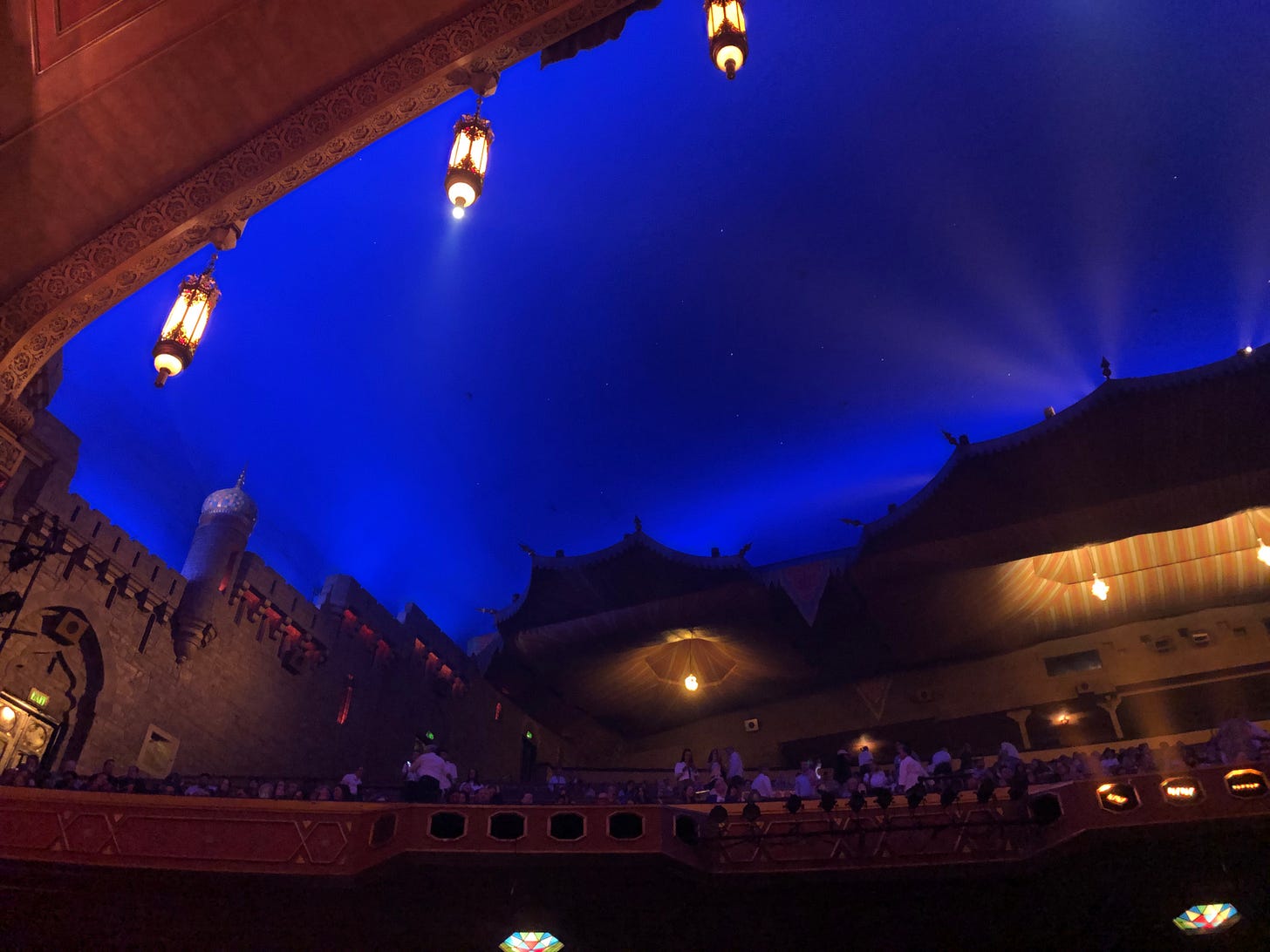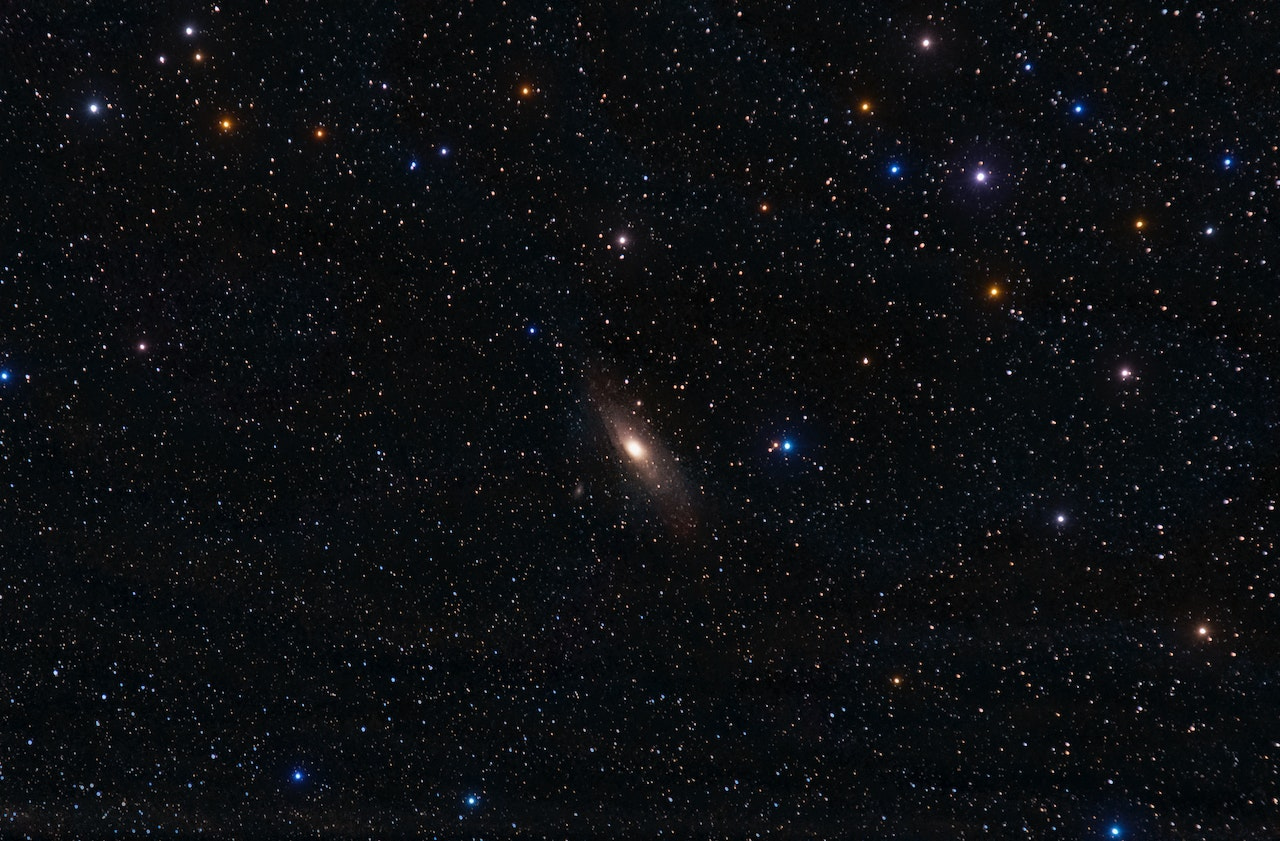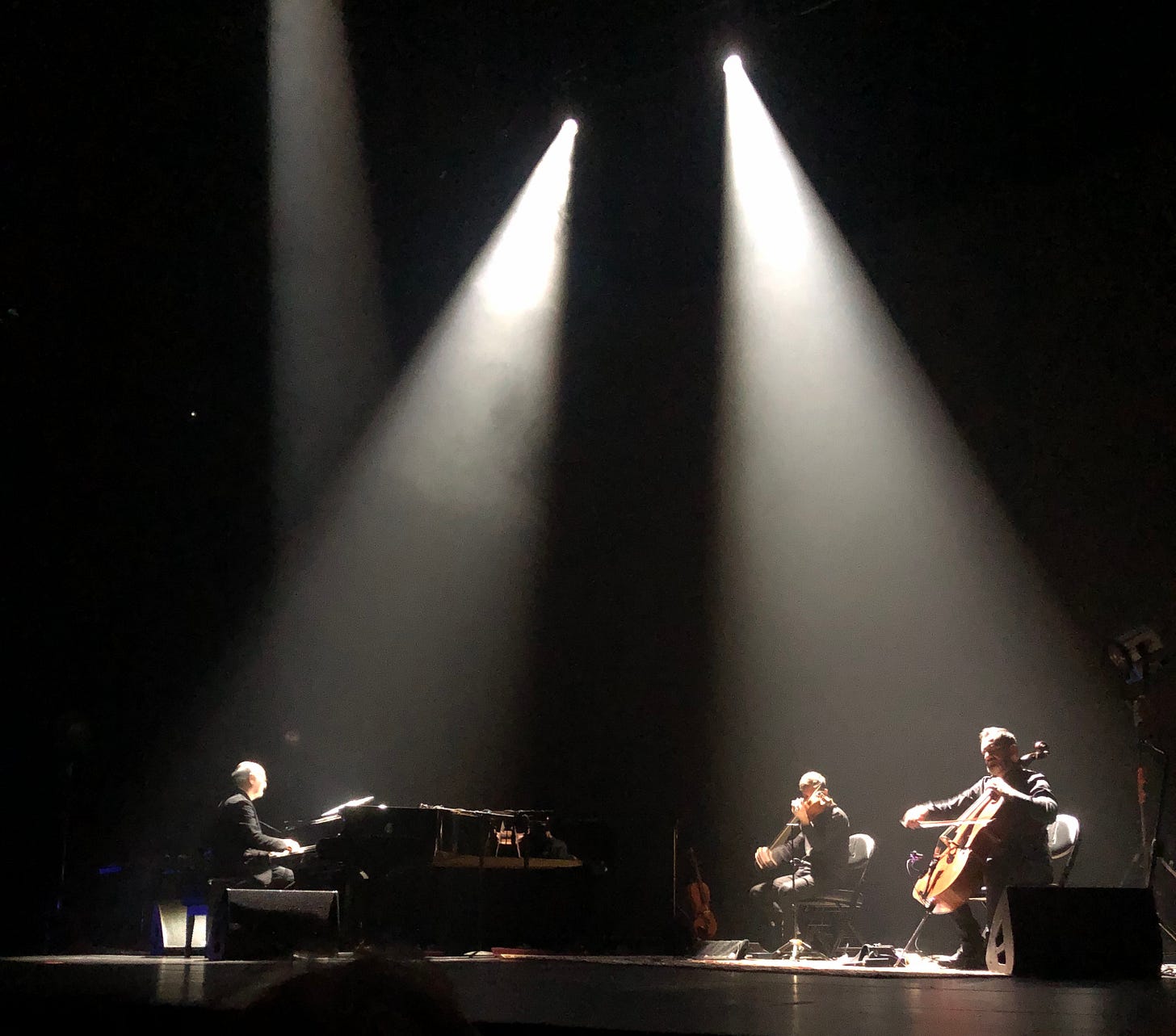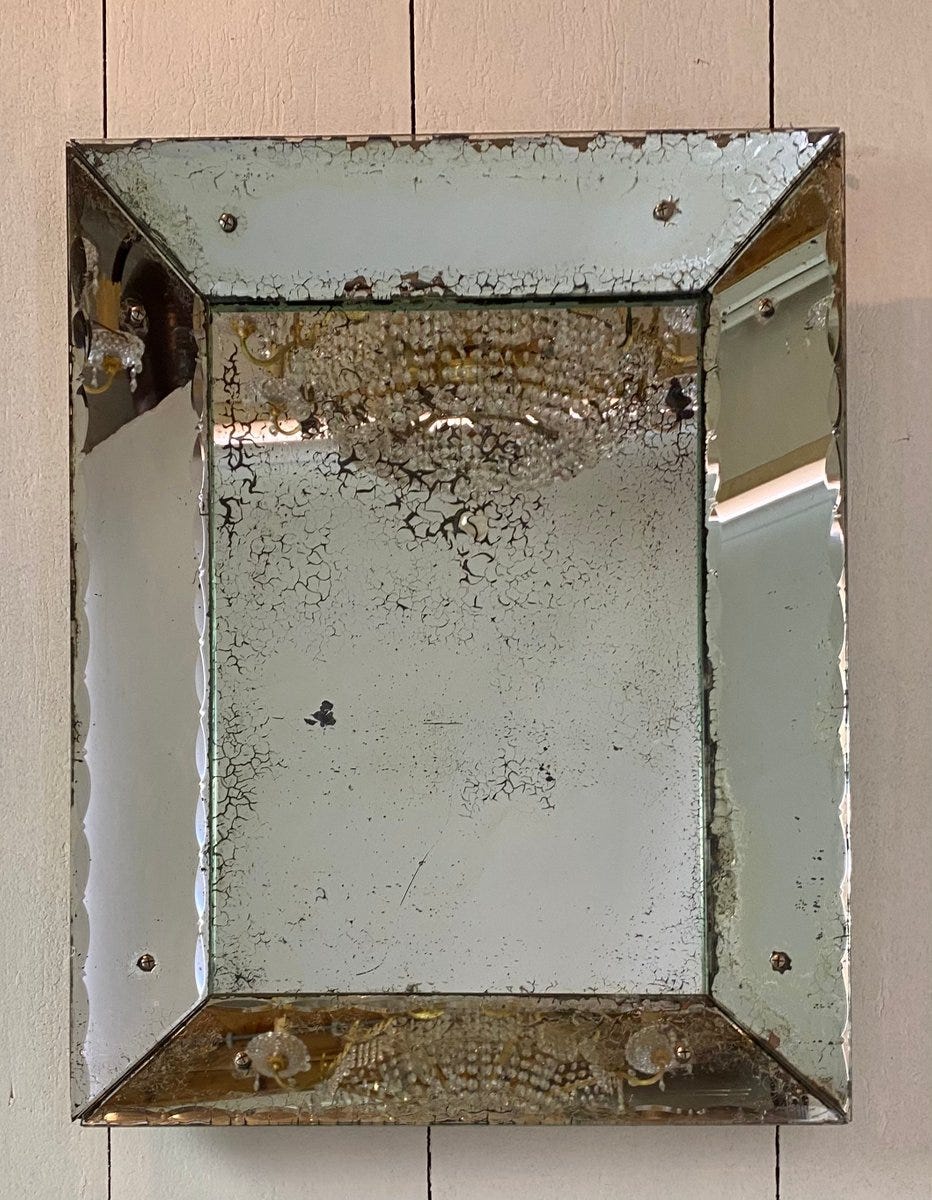The Space Between The Stars
How a Ludovico Einaudi concert sent me spiraling on silence, space, and the unlikely miracle of connection.
Most days, it feels like too much is crammed into the sweaty subway car of my skull: a looming deadline, a mass shooting, an endless scroll of everyone’s opinion on everything all the time, the fact that I’m out of cornstarch. It all clamors for attention so deafeningly, it drowns out the name of the stop we’re approaching and I lose my bearings.
I don’t know if there’s ever been a louder time to be alive. With the ubiquity of media and the addictive quality of phones, we’re elbow to elbow every waking moment in a crowded isolation.
Have you ever been in an office building and the heat or air conditioning you didn’t even realize was running shuts off? Suddenly, a tide of quiet washes the whole place clean and it just feels bigger by several feet. I wish there were a word for that feeling. And then another word for the yearning for it.
But even before the 5G, fiber-optic pace of things became a noisy background hum, people revered the spaciousness of silence – especially those who filled it with music. Debussy famously claimed that “music is the space between the notes.” Louis Armstrong elaborated that “the space between the notes is where the magic lies.” Miles Davis added that “it’s not the notes you play; it’s the notes you don’t play.” And Prince, hallowed be his symbol, really summed it all up: “The space between the notes, that’s the good part. How long the space is…that’s how funky it is or how funky it ain’t.”
The other night, I had the wonderful luck to be gifted tickets to see Italian composer and pianist, Ludovico Einaudi’s “Underwater” tour at Atlanta’s historic Fox Theatre. If you’ve never been to the “Fabulous” Fox, it is an ostentatious wonder. Designed in the 1920’s as a Shriner’s temple that careened out of budget, it was leased by William Fox as a lavish movie palace and remains an Atlanta establishment. The theatre itself holds about 4,500 and was designed to look like a Moorish bazaar – and in some parts, an Egyptian temple – with a trompe l’oeil plaster caravan tent draped above the balcony to funnel sound to the back of the auditorium and a ceiling that looks like the night sky.

I’ve attended plays and movies at the Fox since I was a kid, and to this day, that sky remains a complete source of magic. My mom also remembers being utterly captivated by the sky when she’d attend movies and the ballet as a little girl with her mother’s mother. A projection of wispy clouds drifts along its twilight surface, and it’s spangled with illuminated crystals that flicker like distant stars. (The rumor that one of the crystals was, in true Atlanta fashion, actually a shard of an old Coke bottle was confirmed about a decade ago. It still hangs over house left.)
The place was packed to the rafters and, believe me when I tell you: it was the best people-watching experience I’ve had in a hot minute. As a dyed in the wool introvert, I rarely find crowds anything short of horrific, but this one left me marveling with a goofy grin plastered across my face. The diversity of age (infant to ancient) and attire (hoodies to ball gowns) alone was captivating. I would never have guessed that the most varied crowd I can recall witnessing would be jostling in concession lines for a contemporary composer. It definitely placed a tally in the “win” column for my faith in humanity.
Einaudi walked on stage silently, without fanfare or introduction; the room erupted in the thunder of nine thousand hands clapping. The halo of a follow spot traced his steps from the stage wings to the piano bench where he placed his hand on his heart, took a small, gracious bow, sat down behind a Steinway so glossy it looked like black glass, and lifted his hands to the keys.
Einaudi is known for his minimalism. He’ll play a refrain again and again like an incantation, adding color and nuance as he goes. He mostly keeps his hands confined to a couple of octaves, only occasionally splashing into the high notes.
My seats were close enough to watch his fingers hover above the keys when he paused to punctuate a musical phrase. It looked like he was feeling with his fingertips for how much room each note needed. More than once, a pause stretched for so long, I thought the song had ended. Stillness played through him as dynamically as music.
A few songs in, three musicians walked on stage to accompany him on violin, cello, and various types of percussion. The first violin note that shivered into the darkness of the theatre pulled the emergency brake on the subway of my racing mind. It went still and quiet; the cars sat illuminated and empty.
The quartet’s instrumentation wreathed around itself, undulating in the sleek way of otters or kelp. The strings paused, speaking in call and answer to one another. Some music teaches you how to listen to it as you go; Einaudi’s compositions primed my brain to seek out space.
And then it was all I could notice.
Once, I saw an image taken inside the body of a cello: a warm, wooden, high-ceilinged world – almost like an old barn or country church – lit by the twin, serpentine suns of the f-holes. Sound needs room to reverberate. On the stage, the grand piano’s cavernous mouth yawned nearly 10’ long. The polished, empty curve of its waist mirrored the violinist’s movements in a way that seemed to defy geometry. From my vantage, it looked as if the musician sat beside his own underwater reflection or an apparition of himself.

The room was already full of ghosts. It was the largest crowd I had been a part of since the pandemic, and I couldn’t shake the thought of a second, spectral theatre full of the mourned, the ones who would have wanted to be there among the rumbling bass notes and honeyed strings if they were still here.
I blame the somber cello or the second glass of wine I had before the show, but I found myself turning away from the performance to look into the sea of faces made unearthly by the violet glow from the stage. Many had their eyes closed. That evening, we were all thumpingly alive together, hearts rattling against our ribs like Enauldi’s felted hammers striking the Steinway’s long strings.
But another evening, an unknown but finite number of evenings from now, none of us will be. The concession girl watching from the back and the man with the noisy chip bag and the crying baby and the stern voice who shushed it and the daughter who shook her dad’s arm with excitement at the beginning of every song and the couple holding hands and I — we’ll all be gone. In the strange half-light of the theatre, it felt like both worlds coexisted alongside one another, the future flickering beside the present. Schrodinger’s audience.
• An Intermission •
Whenever I go to the Fox, I opt for the same restroom: the women’s lounge down the staircase from the main lobby. Though the facilities themselves are pretty standard, the rooms outside of them feel historically luxurious with plush if slightly timeworn couches, a small alcove that once housed a telephone, and antique mirror vanities all in a faux Arabian décor.
I leaned close to one of the mirrors to reapply my lipstick. Over time, mercury mirrors begin to glitter on their surface like an ornately framed cosmos, black holes form where the quicksilver shifts or gives in to gravity. If you hold your finger up to one, your reflected finger will not meet it; there is a gap between them. It’s how you know it’s the real deal.
I imagined that in that narrow plane dwelt a twin of all the people who had seen themselves there. A host of reflections greeted me: my round-faced ten-year-old self with an unruly cowlick and an entirely unnecessary purse, my mother as I remembered her then, my mother as the little girl I had never known, her mother across the span of decades, the great-grandmother I never met but whose willfulness and occasional dark turn of mind I’ve been told I share.
As I made my way up the stairs to the lobby, I thought of the reflection I left behind – with some wrinkles, now, and a couple stray grays – chatting on antique couches with my other selves and the selves of my mother and her mother and her mother, all of us in our theatre-going best. I felt a soft flare of jealousy streak through my mind like a comet.
The staging was sparse, and mid-way through the performance, the musicians were backlit by an illuminated scrim. I could only see their silhouettes moving in time with the music. Without being able to watch their faces or fingers, I considered instead the sound itself.
I’m no acoustic scientist, but I know the width between the crests of sound waves determines their frequency. They (I think?) push air particles against our elaborate and delightfully snail-shaped hearing apparatus which, in turn, translates these vibrations into electrical signals.
Space is at work again, in the opening of ion channels, and yet again in the cleft between the synapses that play an elaborate game of telephone until the brain is awash in neurotransmitters that let us know what we’re feeling as the piano, violin, and cello build to a furious crescendo is ecstasy.
I had been so transfixed, I forgot to move and my legs started to cramp. I uncrossed them and played accidental footsie with the elderly Korean woman seated next to me. I put out my hand in silent recognition and apology.
I still don’t understand how, with all the emptiness in an atom, we’re able to touch anything at all – how we don’t just pass wraith-like through the world. Google tells me it’s the Pauli Exclusion Principle, but my eyes glaze over when I try to comprehend atomic clouds and quantum probabilities. I do know, though, that my heart broke a little when my neighbor gently placed her fingertips on my knee for the briefest of moments in acknowledgement and understanding.

I looked up at the Fox’s fabled night sky. Instead of focusing on the blinking stars, I let my eyes rest in the ultramarine between them. How vast the distances are between stars, between planets, between times, between the people we once were and the ones we’re becoming. The majority of existence – from atoms to galaxies – is empty space.
In the face of those odds, to be a sentient creature is boggling. To be in a Moorish movie palace with thousands of other people, all alive and together and bound by the same waves of melody and silence rippling through the room is nothing short of a miracle.
When the show ended, the crowd rose to its feet for what felt like ten minutes of applause. Of course we were grateful; for an hour and a half on an unseasonably cold night in April, we sat beneath a shared facsimile of sky and forgot the fathomless expanses that separate us. Art can feel like a force of physics that way.
Don’t get me wrong: when the concert ended, I still scurried to the exit to beat the crowd. But now, when the crammed subway car of my mind triggers in me a clammy claustrophobia, I put on an Einaudi track. It gives me just enough space to breathe in and room to recall in the face of so much emptiness what a peculiar privilege it is to be anything at all.






Enjoyed reading this so very much!!
So beautifully written and captured. Thank you for sharing.